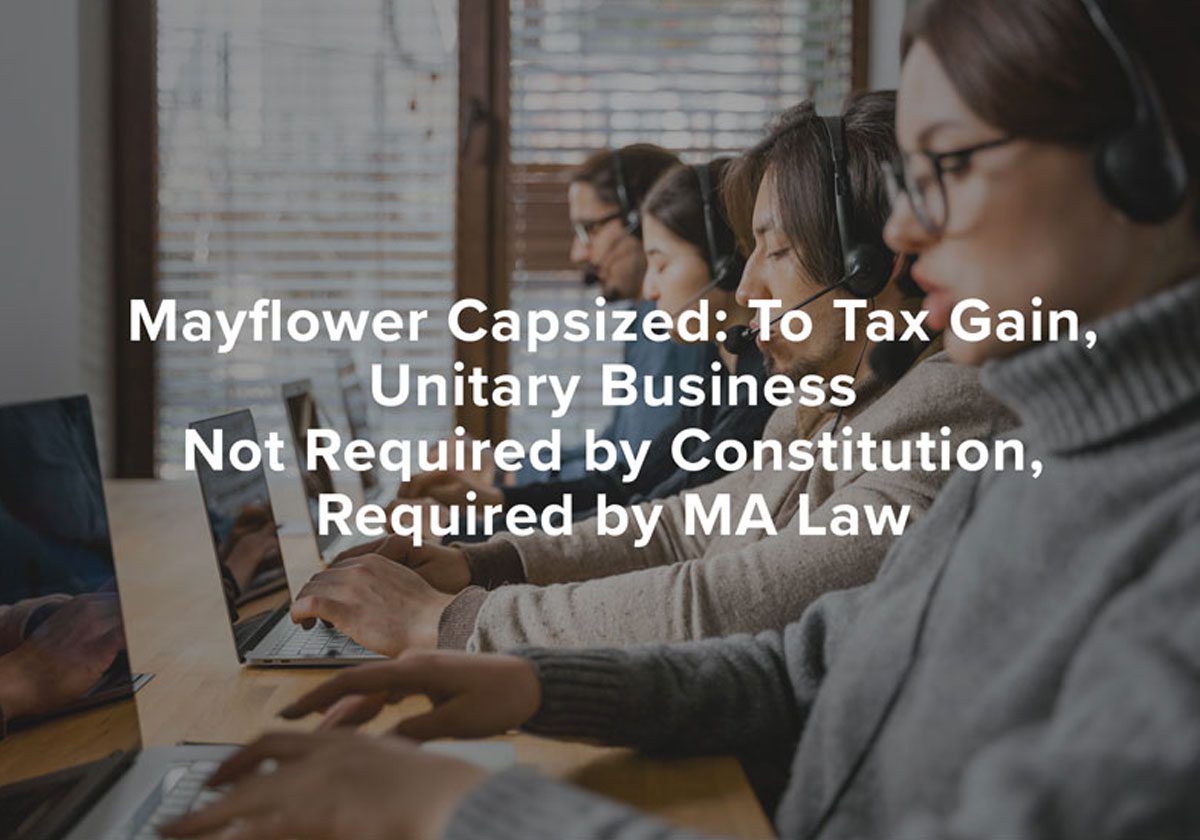On May 16, 2022, the Supreme Judicial Court of Massachusetts (“Court”) decided VAS Holding and Investment LLC v. Mass. Comm’r of Revenue, 489 Mass. 669, overturning the Massachusetts Appellate Tax Board (“Board”) and ruling that an out-of-state holding company’s sale of its investment in a business with Massachusetts operations was not subject to either the Corporate Excise Tax or the Nonresident Composite Tax.
Last December, we published a SALT Buzz, Potatoes and Pilgrims, that discussed the Board’s decision, along with the facts of the case, noting that the pending appeal left the matter open-ended. The Board’s decision was based on the theory of “investee apportionment,” under which a corporate investor may be taxed on income – including a capital gain – from its investee’s operations in a state, even though the investor has no additional connection to that state. The Board supported this theory by citing the U.S. Supreme Court decision, International Harvester v. Wisconsin Dep’t of Taxation, 322 U.S. 435 (1944), and two New York decisions. Most judicial decisions throughout the U.S. regarding whether a gain is subject to tax in a given state base their analysis on whether the investor has a unitary relationship with the company sold. Investee apportionment, by contrast, is based on the proposition that a state may tax a gain as long as that gain includes value created by the operating company within the state. The idea is that the operating company has reached its sale value because, in part, that company has enjoyed the protection of the state’s legal and other infrastructure.
The appellant in the case, VAS Holdings & Investments LLC (“VAS”), argued in its appeal that relatively recent U.S. Supreme Court decisions such as Allied-Signal v. Director, Div. of Taxation, 504 U.S. 768 (1992), and MeadWestvaco Corp. v. Illinois Dep’t of Revenue, 553 U.S. 16 (2008), had determined that only the unitary business principle may be used to determine whether a state may tax an out-of-state business on its gain from an in-state operating company. Regardless of whether investee apportionment was ever a sound theory of extraterritorial taxation, VAS argued, it is no longer so. But VAS failed to convince the Court of this proposition; rather, the Court stated, “the Supreme Court has not held that the unitary business principle is the exclusive methodology permissible under the Constitution to determine the limits of the State’s taxing power.” 489 Mass. at 682. The state may use other means, including investee apportionment, so long as the taxing power relates to opportunities, protections, and other benefits conferred by the state.
Although losing on its constitutional argument, VAS nevertheless won the case. The Court held that, although the U.S. Constitution allows a state to impose a tax on non-unitary income from an investment in that state, the laws of Massachusetts do not. The Court cited numerous provisions from both the Corporate Excise Tax and the Nonresident Composite Tax establishing that, in the Court’s words, “the Legislature has chosen to adhere to the unitary business principle in formulating its taxing policy.” 489 Mass. at 686. The Court cited numerous regulations that further support the requirement that unitary business principles be used to impose tax on a non-resident taxpayer. Because the Commissioner of Revenue had conceded that, “under the unitary business principle as applied to the facts of this case, the capital gain is not taxable in the Commonwealth,” 489 Mass. at 670, there was no question but that the holding company, VAS, was not unitary with the in-state business. In the absence of a unitary relationship, the Court’s reading of the Massachusetts statutes and regulations was sufficient support for its holding that Massachusetts could not impose tax on the gain.
ZHF observation: Because both parties had agreed that there was no unitary relationship between VAS and the Massachusetts business, the Court did not need to discuss whether a passive holding company such as VAS would have broken the unitary relationship between the individual owners of VAS and the Massachusetts operating company. In Potatoes and Pilgrims, we observed that the majority in the Idaho decision, Noell Industries v. Idaho State Tax Comm’n, 167 Idaho 367 (2020), allowed such unity to be broken by the placement of a holding company between an operating company and its founder who continued to be involved with the business through the date of the sale. However, VAS became involved with the Massachusetts business through a merger of that business with VAS’s other holdings in Illinois and Canada. The merger-related restructuring turned VAS into a holding company with no employees, operations, or assets other than bank accounts and its 50% ownership of the Massachusetts business. The owners of the other 50% were Massachusetts residents who had managed the Massachusetts operations both prior and subsequent to the merger, and who did not take part in the sale in question. Unlike many cases involving the sale of a privately held business, the owners of VAS were never directly involved with the Massachusetts operations. Therefore, it appears there was never a unitary relationship between the company sold and the individual investors reporting the gain, regardless of the holding company structure they used for their investment.
For advice on the tax implications of the sale of a business, contact any ZHF professional at 614-326-1120.


